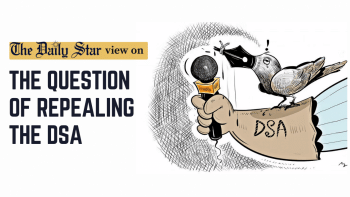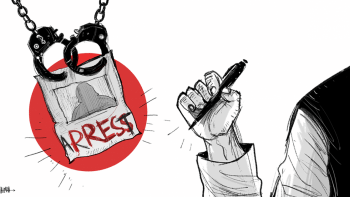A repackaged DSA brings renewed worries

This could be a moment to celebrate for human rights defenders, a moment when a law that has done so much damage to civil liberties is finally done away with. Instead, a rebranded, or rather repackaged, Digital Security Act (DSA) has only sparked scepticism. The cabinet's approval on Monday of a "transformed" and "modernised" version of the law – henceforth renamed Cyber Security Act, to be likely passed in parliament in September – brings to mind how, mere years ago, the erstwhile Section 57 of the ICT Act was struck off only to introduce harsher and broader restrictions on freedom of speech with the DSA.
There are enough reasons to be sceptical of this new (version of the) law. For one, the cabinet's refusal to make its draft public until it is placed in the form of a bill before parliament is suspicious. As per available information, however, none of the offences from the DSA has been decriminalised. Some offences that were previously non-bailable are now eligible for bail, while jail terms for some were either reduced or excluded, albeit retaining the option of fines. In other words, there has been little change beyond a cursory redistribution of punishment. The cabinet secretary has all but acknowledged it when he said that while the DSA is more focused on punitive prison sentences, the Cyber Security Act puts more emphasis on financial penalties. But what about the so-called offences?
Ever since the enactment of the DSA, we have continuously objected to not just the severity of the punishment but also its very characterisation of what constitutes an offence. The government's stubborn refusal to amend or repeal those nine vague, controversial provisions means that people facing charges under the DSA will continue to do so under the new version, too. Equally troubling is the unresolved fate of those already in jail. What will happen to these people? All the trauma and harassment that the victims have faced will likely continue. As well as the lack of clarity on the future of those facing charges, detention or jail time, there is also no word on whether they will receive compensation for their troubles, which they very much deserve.
Moreover, the new version may be as vulnerable to abuse as the one before it. This is why its approval has been met with guarded optimism at best, and outright rejection at worst. We also don't know how journalist-friendly it will be. There was at least a pretence of interacting with the media managers before the DSA was formulated, even though their concerns were not addressed. The government has foregone any such pretence this time. So while we appreciate the effort to finally respond to years of criticism against the DSA, we feel that the government should immediately engage with the media and other stakeholders before proceeding any further. Any reform to the law must respect human rights and the freedom of the press for it to be acceptable.


 For all latest news, follow The Daily Star's Google News channel.
For all latest news, follow The Daily Star's Google News channel. 










Comments